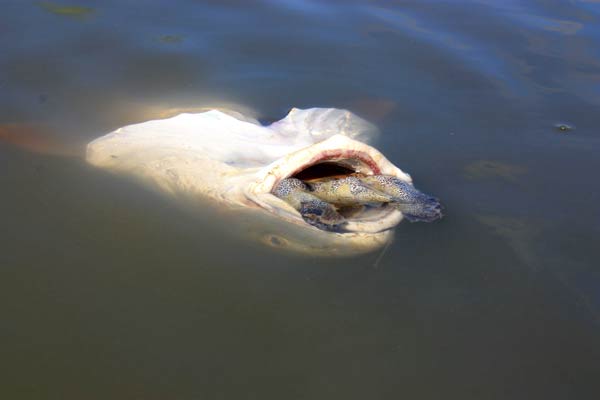Research - Natural Predators
Diamondback terrapins face a number of different predators throughout their lives; however, this important aspect of terrapin life history is often disregarded due to management emphasis on minimizing the direct impacts of manmade activities on terrapin survival, which is also considerably easier to document. As such, public assistance with documenting natural predation of diamondback terrapins is just as important as reporting manmade sources of mortality, particularly given limited data on natural predation for diamondback terrapins in South Carolina.

Because of the shallow (<1 ft.) depth of diamondback terrapin nests31, terrestrial eggs are especially vulnerable to predation by gulls, crows, foxes, raccoons, armadillos, ghost crabs, and anything that can dig, including the roots of various marsh and dune grasses32-35. Most predation of eggs occurs within 48 hours after eggs are laid35 and predation success by predator varies with the habitat where the nests are laid.32 Raccoons and birds continue to place predation pressure on hatchling diamondback terrapins, with most predation occurring during the slow process of hatching32. After hatchling terrapins transition to first year of life habitats, predation by less conspicuous animals such as rats3637 poses an additional threat. Even as adults, diamondback terrapins remain vulnerable to predation by raccoons in terrestrial habitats3438. Because diamondback terrapins are known to nest in residential areas such as under Azalea bushes or sheds or in other areas heavily trafficked by humans, curious dogs also pose a potential threat to diamondback terrapin nests, particularly given the shallow depth of the egg chamber.

In aquatic habitats, red drum consume diamondback terrapins, but likely pose the greatest threat to young terrapins that can be more easily swallowed. A high frequency of occurrence of diamondback terrapin shells in bald eagle nests is reported in southern New Jersey39, but occur infrequently in the stomachs of deceased bald eagles40. Alligator diet studies4142 reveal occasional consumption of freshwater turtles; thus, alligators may also pose a predation risk to diamondback terrapins, particularly following periods of heavy rainfall and runoff which allows alligators to spend time in waterbodies that are normally too salty for extended residence.
